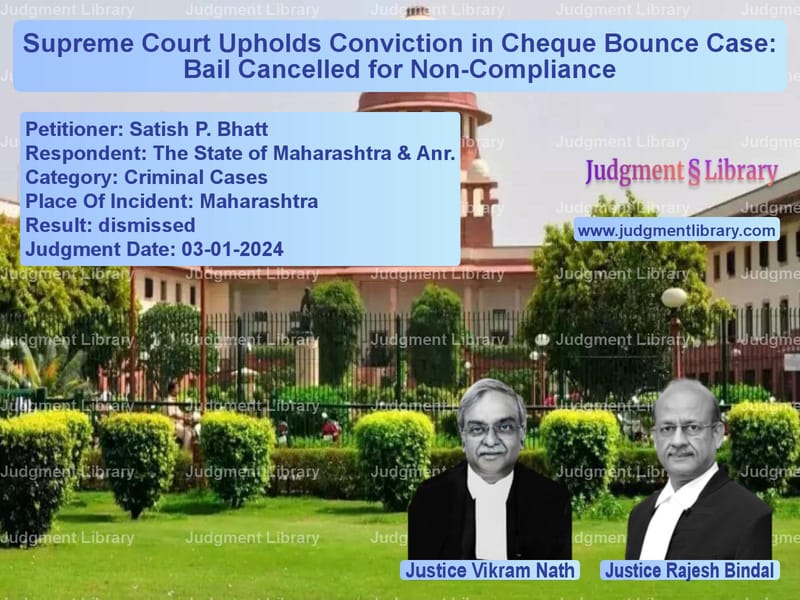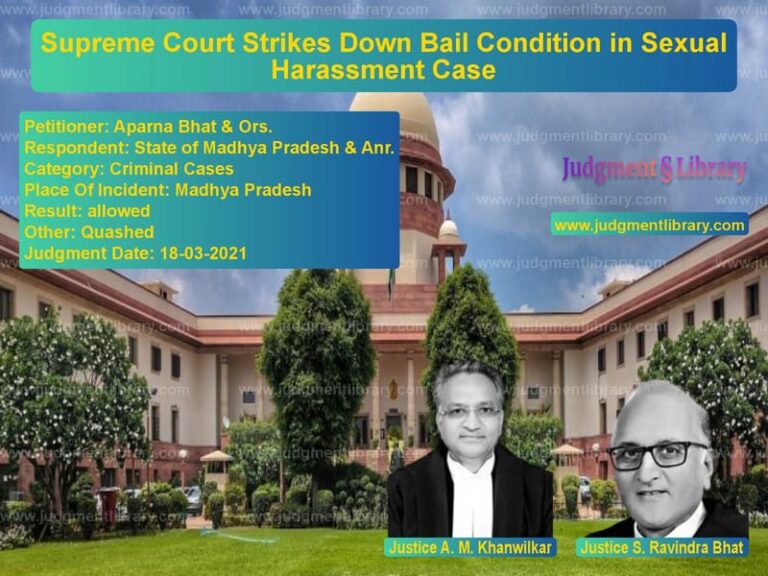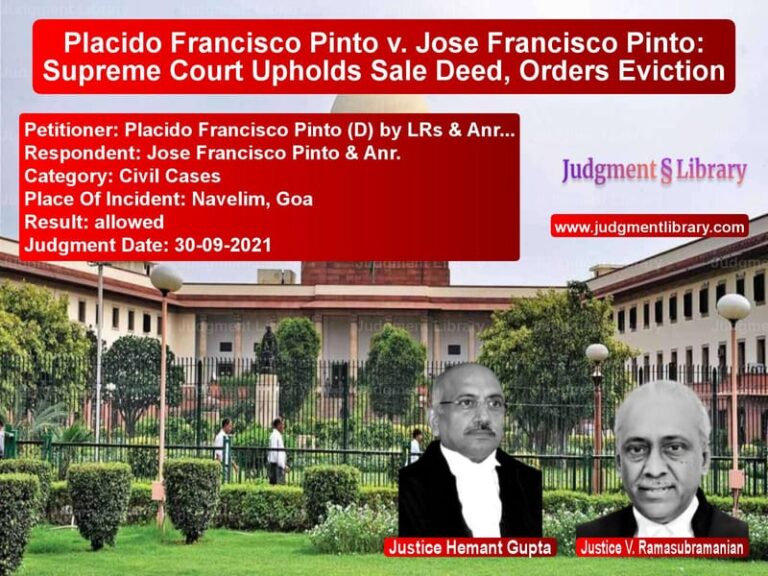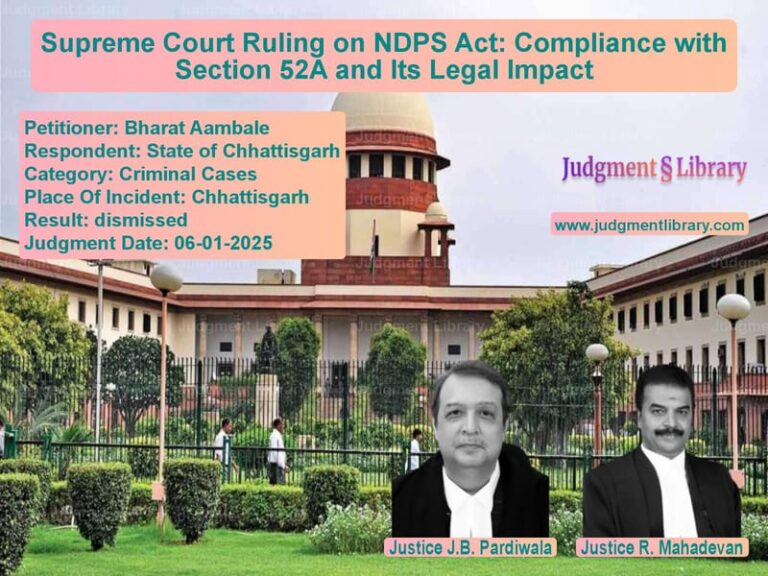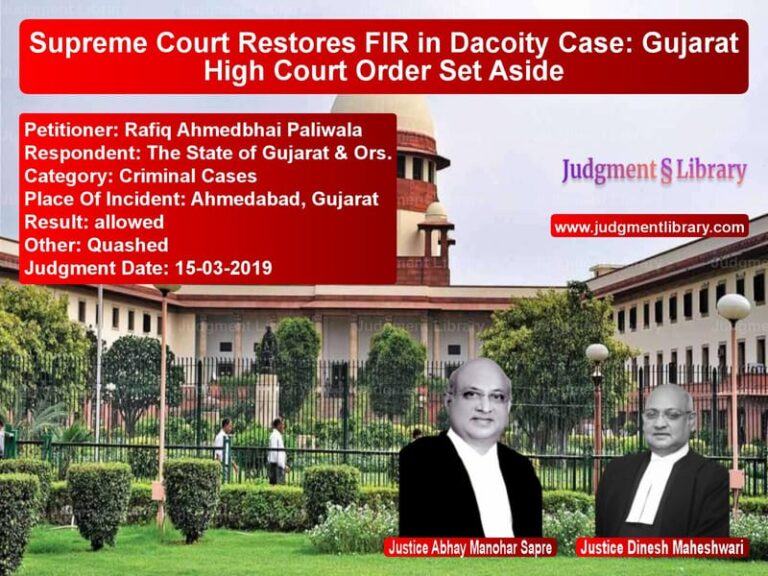Supreme Court Upholds Conviction in Cheque Bounce Case: Bail Cancelled for Non-Compliance
The Supreme Court of India, in its judgment dated January 3, 2024, dismissed the appeal filed by Satish P. Bhatt and upheld the High Court’s decision to cancel his bail for non-compliance with financial obligations under a settlement agreement. The case pertained to a cheque bounce matter under Section 138 of the Negotiable Instruments Act, 1881, involving M/s. Astral Glass Private Limited (AGPL). The appellant, along with his co-director, was convicted for failing to make the agreed payments, leading to legal proceedings that spanned over a decade.
Background of the Case
The dispute arose when the appellant and his co-accused, Vishwanath Ramakrishna Nayak, issued cheques that were dishonored, leading to their conviction under Section 138 of the Negotiable Instruments Act. The Trial Court sentenced them to ten months of simple imprisonment and imposed a financial liability of ₹5 crores across three cases. The sentence was upheld by the Sessions Court on January 30, 2014.
In an attempt to resolve the issue, the accused entered into a settlement agreement with the complainant, agreeing to pay ₹4,63,50,000 in installments. Based on this undertaking, the High Court granted them bail on July 3, 2018, subject to the fulfillment of the financial obligations. However, the accused failed to comply with the agreed payment schedule, leading to the cancellation of their bail.
Key Legal Issues
- Whether the appellant violated the settlement agreement by failing to make payments.
- Whether the High Court’s decision to cancel bail was legally justified.
- Whether the financial obligations under the agreement should be split equally or based on the internal understanding between the accused.
Petitioner’s Arguments
The appellant, represented by his counsel, argued that he had already paid his share of ₹1,95,00,000 as per his understanding of the settlement and was not responsible for any shortfall. He contended that the High Court’s decision to cancel his bail was unjustified since he had met his part of the commitment.
Read also: https://judgmentlibrary.com/supreme-court-upholds-life-sentence-in-puducherry-murder-case/
Respondent’s Arguments
The complainant, on the other hand, asserted that ₹83,10,000 was still outstanding and demanded full compliance with the settlement agreement. He further argued that the accused should also be liable for interest at 12% per annum from March 15, 2019, on the unpaid amount.
The co-accused, Nayak, claimed that the internal agreement between the accused was for a 60:40 liability split, and that he had already paid his share. He alleged that the appellant had fraudulently altered the agreement terms from “as per respective shares” to “equally,” misleading the court.
Supreme Court’s Observations
The Supreme Court emphasized the importance of compliance with judicial orders and financial undertakings, stating:
“The fact remains that the total amount agreed to be paid has not been paid and as per the order of the High Court dated 20.03.2019, the revisionists being in default in payment of the agreed amount, the interim protection granted by way of bail and suspension of sentence, would stand withdrawn without reference to the Court.”
The Court also noted that the complainant had been waiting for justice since 2007, a delay of almost 16 years, despite a legally binding settlement agreement.
Final Judgment
The Supreme Court dismissed the appeal and directed the appellant and the co-accused to surrender within four weeks to serve their sentences. Additionally, a cost of ₹5 lakhs was imposed on the appellant, payable to the complainant within four weeks. The Court also warned that if they failed to surrender, coercive measures would be taken to ensure the execution of the sentence.
Key Takeaways from the Judgment
- Breach of financial undertakings given to the court can lead to the cancellation of bail.
- Courts will not entertain disputes regarding internal financial arrangements between co-accused if the agreed amount remains unpaid.
- Delays in financial compliance can attract penalties and coercive actions.
This judgment underscores the judiciary’s stance on enforcing legal and financial commitments and serves as a warning to those who attempt to evade their obligations despite reaching settlements.
Petitioner Name: Satish P. Bhatt.Respondent Name: The State of Maharashtra & Anr..Judgment By: Justice Vikram Nath, Justice Rajesh Bindal.Place Of Incident: Maharashtra.Judgment Date: 03-01-2024.
Don’t miss out on the full details! Download the complete judgment in PDF format below and gain valuable insights instantly!
Download Judgment: satish-p.-bhatt-vs-the-state-of-maharas-supreme-court-of-india-judgment-dated-03-01-2024.pdf
Directly Download Judgment: Directly download this Judgment
See all petitions in Fraud and Forgery
See all petitions in Bail and Anticipatory Bail
See all petitions in Judgment by Vikram Nath
See all petitions in Judgment by Rajesh Bindal
See all petitions in dismissed
See all petitions in supreme court of India judgments January 2024
See all petitions in 2024 judgments
See all posts in Criminal Cases Category
See all allowed petitions in Criminal Cases Category
See all Dismissed petitions in Criminal Cases Category
See all partially allowed petitions in Criminal Cases Category

